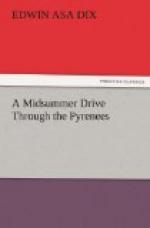To-day, however, this is not to be; Gavarnie beckons, and we gird us anew and press from Gedre on. The carriages twist their way up an unusual incline, and it is ten of the clock as we stop to face a long cascade which is jumping down from a cut across the chasm and not too busy with its own affairs to give us an answering halloo. The great Cirque is now coming more and more distinctly into view, though still some miles ahead. The two breaches are no longer seen, but snow-walls are becoming visible on all sides, and the distant precipices are constantly crowding into line and assuming shape and form. Even Louis the Magnificent’s haughty proclamation, “il n’y a plus de Pyrenees,” could not erase this impassable barrier. It was made for a wall of nations.
Already our destination sends out to welcome us. We have hardly left Gedre, with several miles still to drive, before we are assaulted by peasants on horseback, advance-agents from Gavarnie. The carriage-road will end at the village, and the Cirque itself is three miles beyond; it is reached on foot or on horseback, and these peasants lie in wait along the road for visitors, to forestall their rivals in the letting of saddle-horses, and each to offer his or her particular animal for the way. In vain we assure them that we shall make no choice until we come to the inn at Gavarnie. They turn and ride by the side of the carriages, urging their claims in incessant clamor, pressing about us, intercepting the views, good-tempered enough but decidedly an annoyance. We speak them fair, and request, then direct, them to abandon the chase. It has no effect whatever. They continue their pestering tactics, now falling behind, then ranging again alongside, hindering conversation, interrupting constantly with their jargon. Plainly it is a time for firm measures. We call a halt, and, standing up in the carriage, I tell them once for all and finally that we will have nothing to do with them either now or hereafter, either here or at the village; and order them shortly and decisively to “get out.” Even when translated into French, there is a peculiar tang to this emphatic American expression that is impolite but unmistakable; it takes effect even here in the Gedre solitudes, and we ride on without escort.
[Illustration: THE CIRQUE OF GAVARNIE FROM THE CHAOS.]
The road now passes into a remarkable region,—a famed part of this famed route. This is the Chaos, so-called and justly. The side of the mountain overhead appears to have broken off bodily and fallen into the valley, and its ruins almost choke the bottom. Huge masses of granite and gneiss are scattered everywhere in savage confusion, and the road barely twines a painful way through the labyrinth. Scarcely a blade of grass, a tint of green, is to be seen about us; the tract is given over to utter desolation.
“Confounded
Chaos roar’d
And felt ten-fold confusion in their fall
Through his wild anarchy; so huge a rout
Incumbered him with ruin.”




